What data is declared in Intrastat?
The statistical declaration on internal trade is a monthly report which has to be submitted even if there have been no dispatches to report during the calendar month in question. In such cases a so called nil return, a declaration without a single commodity code, must be submitted. If the company has been given reporting unit codes (INT) the possible nil return must be submitted separately for each unit.
In the statistical declaration, the dispatches from Finland to other EU Member States are declared. A condition for statistical data to be included in the compilation is that the goods physically cross the Finnish border. An exception to this rule are seagoing vessels and aircraft (unladen weight over 2000 kg) and goods delivered to and from offshore installations. There are also exceptions in declaring sea products and spacecraft.
Goods to be included in the statistics are both goods manufactured within the EU as well as goods originating in a third country that have been customs cleared and released into free circulation in the EU, and that have gained Community status (T2 goods).
It is not relevant for the compilation of statistics whether payment transactions are involved in the deliveries or not. As an example, goods supplied free of charge are declared in the statistical declaration if they otherwise fulfil the conditions set on data to be included.
If goods are sent to another EU country from Finland, but the invoice is addressed to a country outside the EU, this dispatch should also be included in the statistical declaration for dispatches (example 5).
Goods sold to another EU country but sent from Finland to a country outside the EU are not included in the Intrastat declaration for dispatches (example 6). A Customs declaration for export is submitted for these goods in Finland. Goods bought from another EU country but delivered to Finland from a country outside the EU (example 7) are subject to a Customs declaration for import in Finland.
The information and more detailed definitions provided in the Intrastat declaration are on the page Information about the declaration.
An Estonian company EE buys goods from a Polish company PL. PL sends the invoice to EE, but the goods are delivered directly from Poland to FI in Finland.
A Finnish company FI submits an Intrastat declaration for this goods delivery, because the goods arrive in Finland physically.
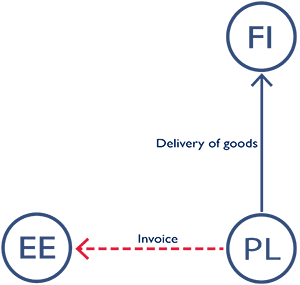
A Finnish company FI buys goods from an Estonian company EE. EE sends the invoice to FI, but the goods are delivered directly from Estonia to Poland.
A Finnish company FI does not submit an Intrastat declaration for this goods delivery, because the goods do not arrive in Finland physically.
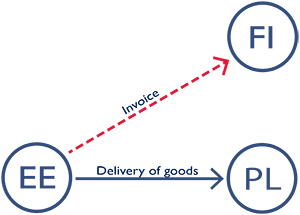
A Finnish company FI buys goods from a Lithuanian company LV. LV invoices FI. The goods are delivered to FI from Estonia. The country of consignment is EE (Estonia) though the invoice comes from the Lithuanian company.
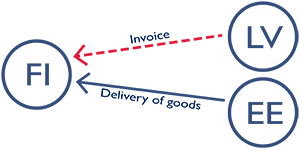
A Finnish company FI buys goods from a Swiss company CH, but the goods are delivered from Germany to Finland.
FI includes these deliveries of goods in its Intrastat declaration, although the invoice has been sent from a country outside the EU.
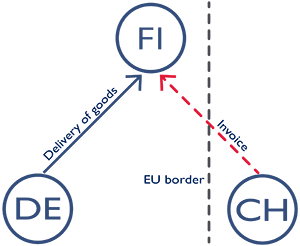
A Finnish company FI sells goods to a Norwegian company NO. The goods are delivered from Finland to Sweden.
FI includes these deliveries of goods in its Intrastat declaration, although the invoice is addressed to a country outside the EU.
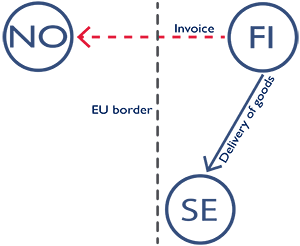
A Finnish company FI sells goods to a Danish company DK, but the goods are delivered from Finland to Japan.
FI does not include these goods in its Intrastat declaration, because the goods are delivered from Finland to a country outside the EU and an export declaration is submitted for them in Finland.
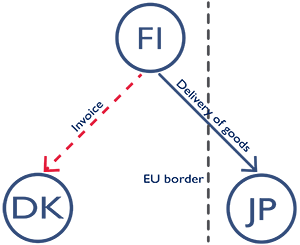
A Finnish company FI buys goods from a Swedish company SE. SE sends the invoice to FI, but the goods are delivered directly from Norway to Finland, where they are cleared.
The statistical data of the goods are retrieved from the customs clearance system for external trade.
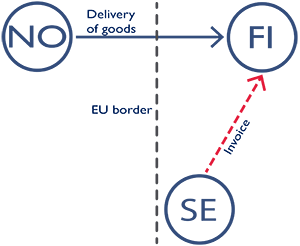
Goods supplied free of charge, with the intention of presenting goods which are the subject of a commercial transaction, are excluded from statistics. Various advertising materials (for example brochures and leaflets) and commercial samples are such goods.
Example 1
A Finnish company (FI) sends brochures advertising products produced by FI to a Swedish company (SE). The consignment also contains samples of these products. The brochures and samples are supplied free of charge and they will not be returned to Finland. Later, FI sells products it has produced to SE.
FI does not declare the brochures or samples with an Intrastat declaration, whereas the goods sold to SE are declared normally.
You can declare goods with a value under 1000 euros on the same invoice during the same statistical month using commodity code 9950 00 00. Mandatory information includes the country of destination, VAT number of the trading partner and the invoice value. Providing other information is optional. In the intrastat declaration service, nature of transaction 11 and mode of transport 1 are pre-filled automatically in the declaration.
Goods delivered indirectly via another EU-member state should also be declared for internal trade statistics. When third country goods released into free circulation in Finland are delivered to another Member State, where the dispatch transport ends, the delivery should be declared with an Intrastat dispatches declaration, and the declaration should be submitted in Finland.
Partial deliveries refer to consignments of goods to be allocated to one commodity code, mostly comprehensive machine and appliances deliveries delivered and possibly also invoiced in several stages, for example due to reasons connected to transportation technology.
Partial deliveries are declared all at once, regardless of when they are invoiced, that is, when all partial deliveries of the goods in question have been sent.
The all-in price of the goods shall be indicated as the value. The transaction code is 11.